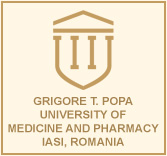Hemorrhagic infarct lung

Pulmonary infarct (hemorrhagic infarct of the lung) is an area of ischemic necrosis produced by venous thrombosis on a background of passive congestion of lung. In infarct area, alveolar walls, vascular walls and bronchioles are necrotic. They appear eosinophilic (pink), homogenous, lacking the nuclei, but keep their shapes - "structured necrosis". Alveolar lumens from infarcted area are invaded by red blood cells - hemorrhagic infarct (red). (H&E, ob. x10)
Hemorrhagic infarct lung (detail)

Pulmonary infarct in an area of passive congestion. The hemosiderin-laden macrophages present inside the alveolar lumen are witnesses of pre-existent passive congestion. (H&E, ob. x20)
Hemorrhagic infarct lung venous thrombosis

Pulmonary (hemorrhagic) infarct produced by venous thrombosis. (H&E, ob. x10)
Additional information :

